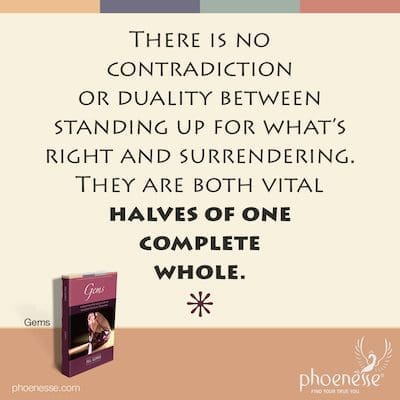One of the most obvious places to witness the hand of God is in nature. How can one not marvel at all the glorious wisdom and foresight that has gone into every itty-bitty detail. The abundance of rare and remarkable creatures proclaims loudly and proudly that only the greatest of minds could have made up such a vast system. One that manages to protect and sustain itself here on Earth. Due, however, to humanity’s greed and thoughtless ways, we are disturbing the balance of nature. The only good news in this is that we are becoming more and more aware that we are doing this.

There is another aspect about nature to consider. Which is that, seemingly contradictory to divine love, there is cruelty in nature. Destructive forces such as storms, floods and earthquakes wreak havoc on living things. Seen from another angle though, these crises are periodically necessary. For they help in getting an entity—whether individual or collective—back into harmony with divine laws.
In another category of cruelty, one species preys on another for survival, creating predators and victims. Of course there are always defense mechanisms for victims, giving them what we like to call a sporting chance. Still, one species is serving as lunch for the other. On a grand scale, somehow nature maintains an overall balance.
True, animals don’t indulge in the kind of useless cruelty and destruction that humans are famous for. But where is God’s presence in serving up one animal to another? Sure, humans have a more evolved consciousness that allows us to choose whether our actions will be for good or for evil. Yet isn’t it tragic that animals must go through panic and pain as part of the natural food chain?
To grasp how all these parts fit together, we must look at the entire web of life on planet Earth. And we humans are part of the equation. What we see reflected in nature happens precisely because this is a dualistic world, combining both good and evil. That our spirit comes here in human form is a direct result of our current state of overall consciousness—which is still characterized by this polarity.
Said another way, our environment—the state of the planet—is created by the totality of our human beliefs. So it reflects our combined inner polarity exactly. We can even see evidence of this in the way some remote parts of the planet seem to have nothing to do with humanity and our current state of consciousness. While this may seem like proof that the Earth is a separate entity from people—including all our attitudes, intentions, beliefs and feelings—in reality this is never so.
Our universe is made up of many, many spheres, or worlds. And all of them—from the lowest to the highest—reflect the overall state of consciousness of the beings who call it home. One could say that heaven and hell are nothing more or less than hangouts for those with the appropriate state of consciousness. Just like on the third rock from the sun.
So then Earth is a place that combines both extremes, but other worlds exist where one polarity disappears. In spheres of evil, there would therefore be only pain and fear and suffering. Conversely, on spheres of beauty, there wouldn’t be any unpleasant feelings at all, and tigers and deer would be friends.
We sometimes dip into this blissful world when we see it reflected in art; our soul recalls it exquisitely and longs to return. So painters and poets, musicians and dancers, can show us a glimpse of an ideal land where flowers don’t die. This is why many of us find expressions of nature so intensely soothing and healing. Meanwhile those who are still mired in darkness may find divine reminders to be painful instead of nourishing.
This is why there are no light switches in the spheres of hell. Literally, the light of truth and love cannot be tolerated. Entities who find themselves there must gradually grow into a more highly evolved state. Eventually, the light of the higher states helps us make our way further down the path of growth and healing.
We actually all start out our journey back to heaven by climbing out of the dark depths of hell. In fact, we start out in such a state of darkness, there is essentially unity. Only as we develop and our consciousness gradually expands does the positive polarity come into play—oh, hello duality. So duality is actually a step in the right direction. On the far end of the spectrum, when we reach our full potential, we will once again be in unity, but this time without the frowny face. Then we’ll be all done with death and destruction, pain and strain. We’ll enter, at last, into the conflict-free zone.
What we really need then, at this point on the tour, are some travel tips for overcoming duality. Perhaps if we can see the pitfalls and associated mind-games, we’ll be able to sidestep some of the pain and strain that are part of this dualistic joyride.
People on a spiritual path of self-knowing like to use the word “surrender,” sensing that this word conveys something mighty important as it relates to spiritual fulfillment. Rightly so. Case in point, those of us who aren’t capable of surrendering to duality aren’t going to have much luck finding the core of our being—our divine nature. We won’t be able to love or truly learn and grow. We’ll be stiff and defended and closed off. Yes siree, surrender is an essential inner movement from which flows everything that is good.
One thing we need to surrender to is God’s will, because without that, we’re SOL. We’ll remain glued to our shortsighted self-will, which is classic for bringing about pain and confusion. And yet we cling. To surrender then means to let go of our ego’s cherished ideas and goals and opinions—all for the sake of being in truth. And let’s be clear, truth and God are synonymous.
What else do we need to surrender to? For one, our own feelings. If we don’t—if we cut off our feeling nature—we’ll impoverish ourselves and basically turn ourselves into robots. Also, we need to surrender to the people we love. We need to trust them and give them the benefit of the doubt; we must be willing to yield if that is what serves the higher cause of being in truth.
Surely we need to surrender to our teachers, spiritual and otherwise, or else no matter how good the teacher, we won’t receive much. If we hold onto reservations, inwardly keeping ourselves aloof, we might learn a little on the mental level. But there are other levels, including emotional and spiritual levels, that will end up shortchanged. Because on these inner levels, we can’t absorb anything unless we surrender.
We can apply this to any mundane thing; if we only pick up something mentally, we haven’t truly learned it. Whatever it may be, if we don’t make it our inner reality, we don’t really own it. In spiritual matters, this is true in spades.
Refusing to surrender has to do with lack of trust as well as suspicion and fear. There is also a general misunderstanding that we’ll be giving up our autonomy along with our ability to make decisions in the future. But our holding out creates a supercharged self-will that wears a person out. As a result, we run on an empty tank.
Surrender, on the other hand, is a movement of fullness. When we give over and let go, enrichment must follow; it’s a natural law. When we hang on to our overdeveloped self-will, we court strife. On the face of the Earth, when two self-wills clash, war gets created—on both the big screen and the small one. If we want peace—between people and between nations—there will need to be a yielding.
But, wow, it so doesn’t work to just say ‘surrender is the key.’ If only it were that simple. For example, are we to surrender to someone who truly can’t be trusted? Should we really be giving in when the situation begs for a fighting spirit if we want to stay in truth? In any healthy and productive life, there will be a time when one must stand up and fight for a good cause, defend the better position, or assert justified claims. There is an indispensable need to have a discriminating mind that knows when to trust. Often we ask: “How am I to know?”
Here, a terrific confusion rises up. In fact, we have more misunderstandings and displaced notions about false surrender and false assertion than we do regarding almost anything else. We tend to capitulate and go into resignation, all under the guise of surrender. So how do we avoid stiffly holding on when surrender is what’s called for? How do we find the right balance?
One key to look for is self-responsibility. For when we deny self-responsibility, it will be quite impossible for the still-dependent ego to surrender; it will feel like we are being asked to give away our autonomy. This explains why the person who won’t ever give in—won’t ever yield—is the one who secretly, and probably unconsciously, craves a perfect authority to come along and take the reins.
In truth, it takes a certain amount of strength for the healthy self to let go and give itself away. But the more we rebel against ‘being told what to do,’ feeling like we must protect our autonomy, the more desperate is our hidden wish to not have to govern our own life; deep down, we don’t want to be made responsible for our decisions or for their outcome.
When we choose a friend, a teacher or a life partner to trust—where a degree of surrender is needed—we are often blind to our demands that the other put up with our own off-kilter ways. Yet we don’t trust them when they accommodate what’s distorted in us. This cocktail of self-will and wonky thinking is the basis for our unrealistic expectations.
In order to learn to trust, we must clear our gaze of our own childish distortions and destructive motives. Then our intuition will function and our observations will be reliable; we’ll have an open channel to the divine within ourselves. We will know that a person doesn’t need to be perfect in order to warrant our trust, and we’ll be able to yield when that’s the right thing to do.
To surrender does not mean to give up our ability to make good choices. Rather, in surrendering, we may see that a change of course is appropriate. For life is constantly rearranging itself, and as everything and everyone around us changes, there’s no guarantee that what is right for us today will also be right tomorrow. If we can surrender in the right way, it will make us stronger and more agile. We will be able to see things more clearly.
The rough terrain to navigate is the interim stage in which we’re not quite whole and therefore objective enough to fully let go into an inner yielding attitude without which it’s impossible to become more whole. So we must try. Both overtly and subtly, on inner and outer levels, we need to attempt to develop self-responsibility in whatever way we can.
To accomplish this, prayer will be required. We need to ask for help, consciously and deliberately, in trusting those who deserve our trust, in following their lead, and in surrendering our own self-will. This surrendering of our self-will is something done as an act toward God, replacing our will with his will. But sometimes his will can’t function through us directly, right off the bat, so it functions through others. God’s hand, for example, will guide us to spiritual leaders to whom we can surrender our will.
It is also God’s will that we surrender to the beautiful involuntary process inside ourselves, such as our feelings of love and our deep intuition. And while God’s will is for us to become capable of yielding, we also must become capable of standing our ground. There is, in fact, no contradiction or duality between surrendering and standing up for what’s right. Neither is possible without the other; they are both vital halves of one complete whole.
Our human struggle is so tragic. We long for a fulfillment that we can and should have, but then we make it impossible to achieve our longing because we won’t surrender. Yet surrendering is our soul’s natural inclination, whether it’s to the creator of all that is, to another person or to being a follower. This is not a passive exercise. It takes active aggression to keep dark forces from making us believe all is futile. They whisper encouragement into our ear to give in to hopelessness and resignation—in other words, false surrender.
If we want to conquer evil, we will need to stand firm and activate the power of our thoughts and inner will to choose faith instead of fear, courage instead of cowardice. Oddly, it takes a mountain of courage to believe in God’s truth and our power to carry it out into the world.
Our work is to find that finely calibrated balance between actions, thoughts and attitudes, and the receptive motion of genuine surrender. But the voluntary decision to let go will at first seem frightening. Really though, it’s the only road to safety. Yet we’ll have to face our reluctance to giving over, using the same honesty and stamina we always employ in exploring the less pleasant aspects of ourselves.
We must learn to recognize the hard inner nucleus in us that denies and holds back. This involuntary hidden part won’t just roll over and respond to our will, so we need to call on the Christ within to make change possible.
Just as we align with our positive intention and goodwill to find and follow God’s will, we must cultivate our ability to yield to other people. But this part is likely to lag behind at first. It won’t respond immediately, so we need to make room for a process to take place within the framework of a greater process; a hidden corner of our soul needs a chance to catch up with the rest of us.
True story: we have no concept of just how strong our spirits are. We underestimate ourselves, believing we are more ineffectual and weaker than we actually are. Since we believe this, we experience this, making it hard to see the full strength of our capabilities. So while we can create anything, we often create undesirable outcomes that cascade from our negative outlook on life.
What we need to discover is the power of our living spirit, but we are blocked to it. We wallow in the mistaken notion that we are helpless and beaten by the adversities of life. Popular depictions of God perpetuate this crazy idea that we’re helpless. Yes, all the power is with God who is the source of everything, but that doesn’t mean we can’t unite with this power source and let it flow through our circuits. We can become receptive to it, and in turn, be an active agent for God. We could be a relay station for wonderment, if only we knew it and used this force wisely.
The root cause of our block is the self-will of our limited mind, which often operates contrary to divine law and God’s will. We paralyze our creative forces by tightfistedly holding on to our self-will. The childish, immature part of ourselves doesn’t want to grow up and become a self-creating unit; it wants to be given to. We must wake up to this ignorance so we can find our inherent potential to change and heal our soul substance. Then we will know who we truly are.
In this new awareness is the healing, balancing force that reconciles the opposites of duality: surrendering and standing firm, yielding and asserting ourselves, giving in and fighting the good fight. We’ll discover that both sides are necessary and equal. In every situation, we will automatically create a harmonious response that is adequate and right. But we’ll need to grope our way into this state until we function naturally and our responses are organic.
Once we surrender, an involuntary inner relaxation will seem to just naturally, gradually happen, but it results from our voluntary efforts to change. There is a known phenomenon that illustrates what’s happening here. When a person is in a lot of pain, they will reach a point when they can’t bear the pain any more. At that point, on an involuntary level, they’ll stop fighting it. The surrendering will just take over, going beyond the conscious, volitional mind and will. Suddenly, the pain will cease and it will turn into ecstasy. Devilish people who torture human beings, often for political or other power-related reasons, know about this. When they see this transition happening, they halt the torture and let the victim regain their resistance. This shows that anything, including pain, can be transcended through surrender.
Our goal is to complete ourselves and become whole, and the motion of surrender sweeps us along in this direction. We can surrender ourselves and our feelings to our teachers and our leaders, our intimate partners and our friends. When in doubt, we can always surrender to God. This is an action that is forever beneficial and appropriate.
Return to Gems Contents



